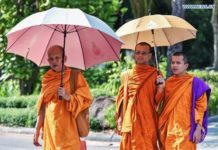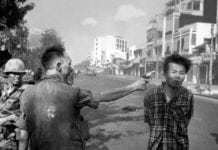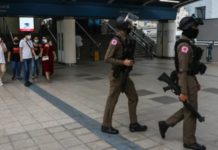
Taiwanese actress Charlene An had returned from holidays in Bangkok with her friends and decided to share her unsettling experience as a tourist.
“Goodbye! Rotten Bangkok,” she wrote on Instagram last month.
An, who has nearly 380,000 followers on Instagram and Facebook, put out a series of social media posts on police extortion, which quickly turned into a corruption scandal involving Thailand’s police force.
“More than 20,000 baht was extorted from me. Otherwise, I’d have to go to the police station. Thailand is so terrible. I wasted hours. So scary,” she wrote.
An was in a Grab car with her friends when they were stopped and searched at a police checkpoint in Huai Khwang district on Jan 4.
The group was allegedly coerced into paying 27,000 baht (US$782) in bribes to the police for possessing three e-cigarettes – which are illegal for import and sale in Thailand – and for not carrying their passports with visas, before they were freed.
An said she had her passport with her and showed the police her visa on arrival. Still, she was told it was unacceptable and that she needed a visa printed in her passport with an official emblem.
“Whoever is going to Thailand, be careful! Thailand is so dark. I won’t go back there again. They’ll find an opportunity and all the reasons to arrest you,” the actress warned her followers on Instagram.
An’s social media posts sparked a public outcry about abuse of power and corruption in the Thai police force – a notorious problem perceived to be ingrained in the institution, which is under the command of Prime Minister Gen Prayut Chan-o-cha.
Despite the initial denial by Thai authorities, closer investigation by the Metropolitan Police Bureau revealed irregular behaviour by officers at the checkpoint. Subsequently, six of them were charged with bribery and dereliction of duty.
National Police chief Pol Gen Damrongsak Kittiprapas apologised to An and her friends.
“Our country welcomes a large number of tourists. Therefore, the immigration, tourist and local police officers must take the best care of them,” he said on Jan 31 at the National Police headquarters in Bangkok.
“About the incident that happened, for whatever faults that have occurred, I – as the chief of the unit – have to apologise to the people who have been affected in this case.”

The case happened just when Thailand’s tourism sector was beginning to recover from the COVID-19 pandemic, raising concern about its potential repercussions on the country’s image and economy.
“From a tourism perspective, it has damaged the country’s image. What I’m worried about is that it could result in copycat behaviours, meaning civil servants from other units may start to see tourists as tools to seek illegal income,” said Paisarn Suethanuwong, a committee member of the Professional Tourist Guide Association of Thailand.
“This would be even more damaging.”
Paisarn believes such malpractice can be stopped if the problem is addressed without leniency. He said transparency of the investigation into the recent incident is also crucial, and that serious actions should be taken against the officers if they are found guilty of the alleged misconduct.
“Will this case impact tourism? Not really in the short term. But definitely, if we’re talking about Thailand’s image, it has adversely affected the country,” he said.
Move Forward Party Member of Parliament Rangsiman Rome also told CNA: “This incident could have an immeasurable effect on Thailand’s image.
“Tourism is one of the country’s key incomes. If we can’t make tourists feel safe when they visit Thailand, this will quickly destroy the country’s fame and image, which we’ve taken a long time to establish.”
The opposition lawmaker has been vocal about corruption in the Thai police force. He told CNA that foreign tourists tend to fall victim to extortion in Thailand because they are not familiar with Thai laws and usually carry a lot of cash for travelling in the country.
“It’s normal for people who travel abroad to not want any trouble with governmental officials in the area they visit,” Rangsiman noted.
“Many tourists feel they have no choice but to pay a bribe in order to end the problem. Moreover, some police officers feel they can demand a higher price from foreigners than from Thais, who can better negotiate with the authorities.”
Besides An’s case, a similar incident was reported last month in the popular coastal city of Pattaya, Chonburi.
A police officer allegedly extorted 30,000 baht from a Chinese tourist for possession of an e-cigarette. The cop initially demanded 60,000 baht but the price dropped after negotiation, according to local media.
The news prompted the Chonburi police to investigate the incident. Its fact-finding committee later found the officer in question had “grossly breached the discipline”. He was dismissed from his job earlier this month while legal actions were prepared against him.
E-CIGARETTE, PASSPORT AND VISA ON ARRIVAL
Did An and her friends break any rules?
On Feb 1, one of An’s friends gave a press conference in Bangkok. He is known as Jz Sky, a Singaporean national who was with An when the group was stopped and searched by Thai police in January.
Sky told reporters he was in a car with An and two other Singaporean friends when the police stopped their vehicle and asked them to get out for inspection.
“When I got out of the car, the police checked my pockets and asked me to show him what was inside.”
According to Sky, the police confiscated three e-cigarettes he and his friends had previously bought in Bangkok, and asked to see their passports. The three Singaporeans did not carry theirs at the time and the officer would not accept any soft copy on their phones, he claimed.
“The officer asked if I had 27,000 baht. One e-cigarette was 8,000 baht, plus the three of us who didn’t carry our passports,” he told the media.
“Including the passports, the price became 27,000 baht.”
The group was forbidden from taking any photographs or videos of the inspection and threatened with imprisonment, he added.
Although the sale and import of e-cigarettes is illegal in Thailand, the products are widely sold and used in the country.
Any individual who possesses an e-cigarette in Thailand could face up to five years in prison or a fine worth four times its value, or both, according to the Office of the Consumer Protection Board.

When it comes to carrying a passport, however, there is no legislation requiring foreigners in Thailand to carry their passports at all times.
Krirkrit Choupunyanon, managing attorney from legal firm Krirkrit & Associates Limited, told CNA that under the Immigration Act B.E 2522 (1979), foreign nationals who do not have a valid passport or travel document are not allowed to enter Thailand.
“This is merely a legal presumption; if the foreigner can present their passport to the officer, there won’t be any consequences,” he said.
According to the Royal Thai Police, foreign tourists who do not carry their actual passports with them can present a copy or a photograph of the travel document when asked by a police officer.
As for the visa on arrival, Krirkrit said it is legitimate as long as the holder is a citizen of a country that has an agreement on the visa on arrival with Thailand.
“Visa on arrival is a tourist visa,” he explained. – CNA



































